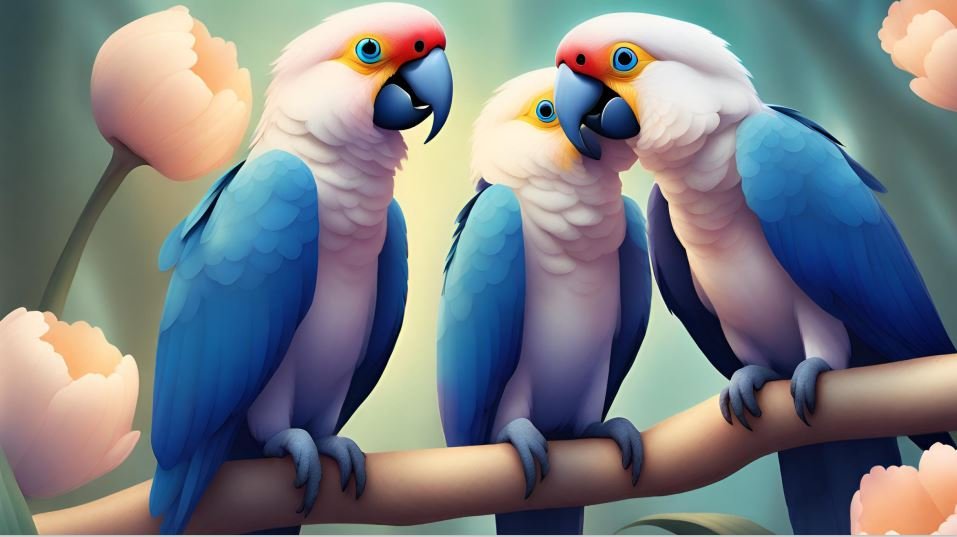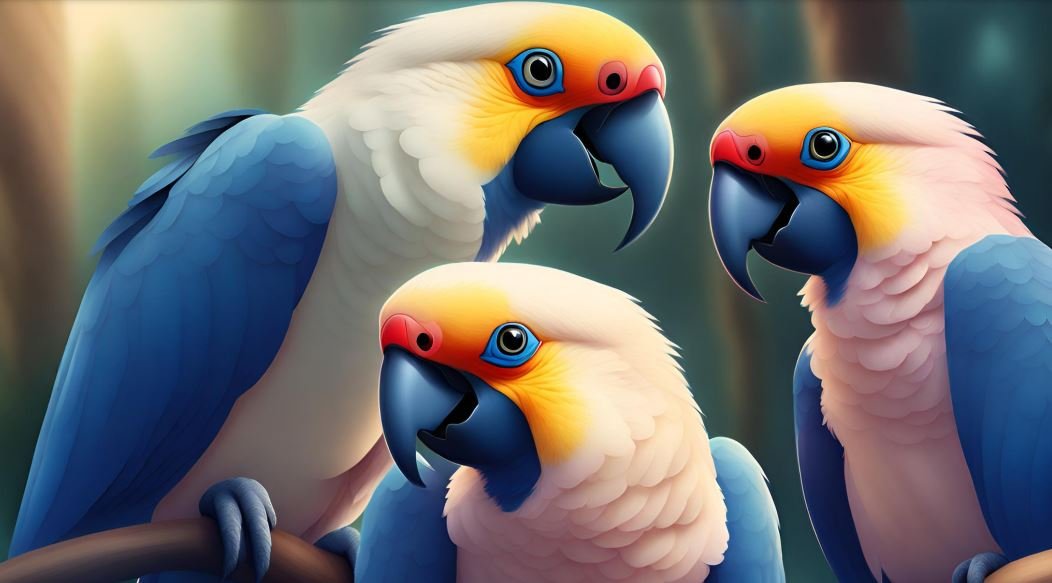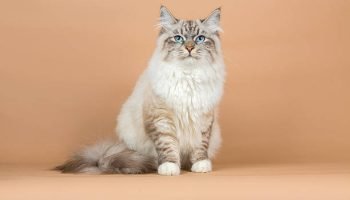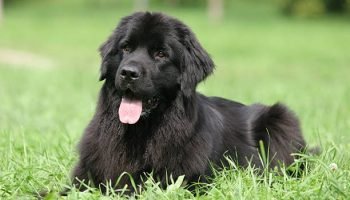In a world painted in vibrant plumage, where cobalt wings slice through emerald skies, a whisper of white emerges. Meet the Albino Hyacinth Macaw, a sun-kissed enigma with feathers spun from moonlight. Less than 1% of these majestic parrots don this ghostly attire, their eyes pools of pale gold, their gaze as piercing as a desert sunbeam. Beyond rarity, they hold secrets, whispered in the rustle of their ivory feathers. Dive with us into their world, where shadows dance and brilliance takes on a new form.
Albino Hyacinth Macaws Look

The albino hyacinth macaws are truly captivating birds possessing a one-of-a-kind and ethereal appearance. Picture a macaw that deviates from the tapestry of blues and gold and is instead adorned in a celestial cloak of pure white. Their feathers form a canvas of ivory occasionally touched by the hint of cream or pearl. In contrast, to the deep horn color, their beaks and legs take on a pale translucent yellow hue.
Here are some notable characteristics that set them apart;
Ivory plumage; The feathers bathe in the shades of ivory showcasing variations of cream or pearl. This creates a glow that appears to shimmer beautifully in sunlight.
Pale eyes; Unlike their counterparts with deep brown eyes albinos possess mesmerizing irises that glimmer with delicate shades of pale pink or lilac. These eyes exude depth and wisdom.
Distinctive beak and legs; The absence of melanin affects not their feathers but their beaks and legs. These parts showcase a pale yellow shade that forms an exquisite contrast, against the ivory plumage.
Elegant movements; Every action performed by an albino macaw exhibits a supernatural gracefulness.
The albino hyacinth macaws gracefully soar through the air their wings moving with ease and elegance. Their flight resembles a mesmerizing ballet quietly performed against the backdrop of the sky. These magnificent creatures are truly awe-inspiring showcasing an appearance that exemplifies the interplay of genetics and serves as a constant reminder of nature’s boundless beauty.
Adaptive Behavior of Albino Hyacinth Macaws
Albino hyacinth macaws, with their paler eyes, are more sensitive to sunlight compared to their albino counterparts. As a result, they tend to be more cautious about venturing out during the day in sunny conditions. They often prefer staying in areas or coming out early in the morning or evening when the light is less intense.
When it comes to interactions some studies suggest that albinism can impact a bird’s ability to socialize with birds. Their distinctive appearance may cause them to stand out from the flock potentially leading to ostracization or exclusion by macaws. This can result in feelings of isolation and loneliness.
Due to their lack of pigmentation albino hyacinth macaws are easily noticeable than their albino counterparts. This heightened visibility makes them more vulnerable to predators in the wild. They may become targets, for hawks or other predators. Might struggle with blending into their surroundings effectively.
Born in Moonlight: Celebrating the Majesty of Albino Hyacinths
When it comes to the personality of macaws, with albinism it is challenging to make statements because each bird has its own unique personality regardless of its genetic makeup. However, some owners of albino macaws have noticed that their birds tend to be calmer and less aggressive compared to albino macaws. This could be attributed to their sensitivity toward light and their preference for avoiding sunlight, which may make them appear active or energetic.
As for intelligence, there is no evidence suggesting that albinism has any impact on the abilities of macaws. Albino macaws exhibit the same level of intelligence and curiosity as their albino counterparts. They are capable of learning tricks solving puzzles and forming bonds with their companions.
Regarding vocalizations, albino hyacinth macaws are known for their penetrating calls. This characteristic is shared among all macaws regardless of their coloration. However, some owners have observed that albino macaws might even be louder than albino ones. This heightened vocalization could be attributed to their increased sensitivity, towards light and sound.
It’s important to bear in mind that these observations are trends and individual albino hyacinth macaws can still vary in terms of behavior and personality. Some albino macaws may exhibit tendencies while others might be more active.
Creating a nurturing and home environment is crucial, for your albino macaw to ensure they feel loved, safe, and protected.
Availability and Ownership of Albino Hyacinth Macaws
For years bird enthusiasts have been captivated by the appearance of albino macaws. These birds, with their feathers and pale yellow eyes, are truly a sight to behold. However, due to their rarity and potential health challenges, it’s important to consider factors before deciding to own one of these unique creatures.
Availability and Cost
Rarity; Albino hyacinth macaws are incredibly rare with 1 in every 10,000 births resulting in an albino specimen. This extreme scarcity is one of the factors that drives up their price significantly compared to albino hyacinths. In fact among parrots, these birds are already known for being quite expensive. So if you’re looking to add an albino macaw to your collection be prepared to invest upwards of $50,000 or even $100,000 for a chick.
Breeding Challenges; Breeding albino hyacinths poses challenges due to the nature of the albinism gene. To successfully produce albino offspring breeders must carefully select mating pairs that both carry the gene.. With this careful selection process, in place, there’s still no guarantee that all offspring will inherit the albino traits. This further contributes to the availability and high price associated with these birds.

Factors to Consider When Owning an Albino Hyacinth Macaw
Regulations; It’s important to be aware of the aspects of owning an albino macaw as regulations may vary depending on your location. The Convention, on International Trade in Endangered Species of Wild Fauna and Flora (CITES) categorizes macaws under Appendix I, which means that international trade is generally prohibited unless authorized by permits. Before considering purchasing a macaw make sure to familiarize yourself with the wildlife conservation laws in your area.
Experience and Commitment; Keeping a macaw regardless of its coloration requires owners who can provide a spacious aviary, a specialized diet, regular interaction, and mental stimulation. Albino hyacinths may have needs due to their sensitivity and potential health concerns. It’s important to understand that owning one is a long-term commitment since these birds can live for 50 to 80 years.
Health Considerations; While generally healthy albino hyacinth macaws might be more prone to health issues such as sunburn, vision problems, and immune system deficiencies. Regular veterinary checkups are crucial for monitoring their health and promptly addressing any issues.
Ethical Considerations; Some animal welfare advocates express concerns about breeding animals for their appearance particularly when it involves mutations, like albinism that might present health challenges. Before making a decision carefully reflect on the implications associated with owning an albino hyacinth macaw.
Considering Alternatives to Ownership
If you’re captivated by the allure of an albino macaw but find the responsibilities of ownership overwhelming there are ways to engage with these magnificent birds;
1. Visit breeders or sanctuaries; observe and interact with albino macaws in a controlled environment. This can be a fulfilling experience that doesn’t require ownership.
2. Support conservation efforts; Organizations dedicated to protecting macaws in their habitat rely on donations and volunteers. Contributing to these efforts helps safeguard these birds for generations.
3. Educate others; Raise awareness, about albino macaws and the challenges they face. By sharing information we can promote practices. Ensure their well-being.
Ultimately the decision of whether or not to own an albino macaw is deeply personal. Carefully consider the potential challenges alongside the rewards of caring for such a captivating bird. Remember, responsible ownership means prioritizing the birds well being, above all else.
Other Fascinating Aspects of Albinism, in Hyacinth Macaws
Diet and Nutrition
Impact of Melanin on absorption; Melanin plays a role in synthesizing vitamin D. In albino macaws the absence of melanin may affect their ability to absorb vitamin D, necessitating adjustments or supplements to prevent deficiencies.
Specific dietary requirements; Albino hyacinths may have needs due to their sensitive skin and potential vision impairments. It is advisable to consult a veterinarian for advice on selecting the best food options to ensure optimal health and well-being.
Breeding and Genetics
breeding practices; Breeders might prioritize traits, such as feather patterns or eye color variations within the albino hyacinth population resulting in further variations in appearance.
Testing and ethical considerations; Genetic testing can identify albino chicks at an early stage. However, concerns arise about the exploitation of these birds for purposes. It is essential to consider implications while conducting tests.
Cultural Significance and Symbolism
Uniqueness and rarity; Certain cultures hold admiration for albino hyacinths due to their beauty and perceived spiritual significance. Their rarity adds to their allure and cultural value.
Challenges and misconceptions; Regrettably albino animals often face stigma or exploitation due to their appearance. Raising awareness about the challenges they encounter and promoting ownership practices becomes crucial, in combating these misconceptions.
Future. Conservation
Enhancing our understanding of albinism mutation;
Ongoing studies are being conducted to explore the processes involved in albinism among hyacinths. How it may affect their overall well-being and ability to thrive.
Efforts, for conservation; It is vital to prioritize the safeguarding of macaws in their environment as this is crucial, for the survival of both albino and non-albino populations. Supporting conservation organizations and advocating for habitat protection are actions that need to be taken.
conclusion
In a world awash with color, the albino hyacinth macaw stands as a stark, breathtaking contrast. Their moonlit feathers whisper tales of resilience and adaptation, their pale eyes reflecting a depth of spirit that transcends mere pigment. Owning one is not simply acquiring a pet, but embarking on a journey alongside a feathered enigma, a silent symphony of grace and vulnerability. Let the whispers guide you, for in their ethereal beauty lies a truth: the true measure of a macaw lies not in its plumage, but in the untamed spirit that soars within
Our previous post – Whiteface Pied Cockatiel: A Rare Gem in the Avian World













